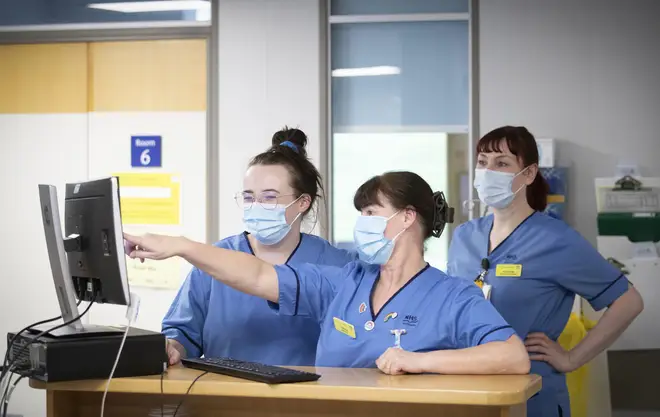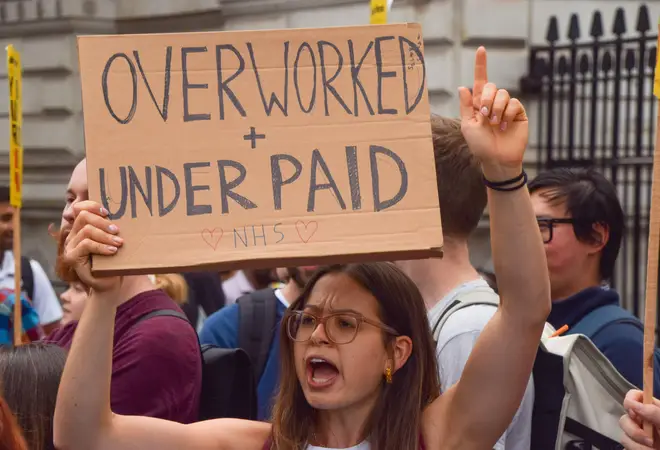
Nick Ferrari 7am - 10am
9 August 2022, 08:52 | Updated: 9 August 2022, 13:49

RCN Director speaks to LBC on nursing strike
"Exhausted and demoralised" NHS nurses will start voting next month on whether to strike over pay in what's being described as a "pinnacle moment" for the profession.
The Royal College of Nursing's (RCN) recommending hundreds of thousands of its members support industrial action in September.
If its members support strike action, it will be the first ever walkout by RCN members in England or Wales.
The college went on strike for the first time in its history in Northern Ireland in 2019.
The postal ballot, which will open on Thursday September 15 for four weeks, will ask RCN members working for the NHS on Agenda for Change contracts if they will take strike action which involves a complete withdrawal of labour.
The college has called for a pay rise for nursing staff of 5% above RPI inflation, which is currently 11.8%.
Read more: Fury as nurses 'banned from drinking water or using fans' as heatwave sweeps across UK
Read more: London standstill: Bus drivers join rail and Tube staff in mass strike in August

The RCN's Interim Director Helen Whyley told LBC nurses are "demoralised and exhausted", warning a strike would be a "pinnacle moment" for the profession.
"This really is a pinnacle moment for nursing and patient care, and I want to be really clear that this is all about patient care," she told LBC's Nick Ferrari at Breakfast.
"Of course it's linked to pay, but the two things can not be untwined - they are intrinsically knitted together.
"They're demoralised, they're exhausted and they really need to see the government step up and tackle the nursing workforce issues absolutely head on."
She explained that RCN members "in effect take a pay cut this year".
"Just imagine what it's like walking on to a shift, going into a community, being in an A&E department, looking after people who are suicidal, and not having colleagues standing next to you. There's not enough of you to do that.

"Nursing is a safety critical profession and we've had enough, this is not good enough for our patients, and it's not good enough for our nursing staff."
Last month the Government announced a pay award the RCN said leaves an experienced nurse more than £1,000 worse off in real terms, describing it as "a national disgrace".
RCN officials said industrial strike action was a last resort, but the current NHS staffing crisis was causing "unacceptable risk" to patients and staff.
A formal pay announcement is still awaited in Northern Ireland, while in Scotland the college has urged its members to reject a 5% pay offer from the Scottish government.
Pat Cullen's the union's general secretary and says it's all about trying to provide safe care for patients.
She said: "Nursing staff will stop at nothing to protect their patients.
"Staff shortages are putting patient safety at risk and the Government's failure to listen has left us with no choice but to advocate for strike action.
"A lifetime of service must never mean a lifetime of poverty. Ministers' refusal to recognise the skill and responsibility of the job is pushing people out of the profession.
"The next prime minister must change course urgently."
Carol Popplestone, who chairs the RCN Council, said in a message to members: "After years of underpayment and staff shortages, the fight for fair pay must strengthen.
"This year's pay award does not help you with the rising cost of living. It will do nothing to help to recruit or retain more nursing staff where you work and will not keep patients safe."
The ballot comes after weeks of crippling rail and Tube strikes caused chaos for commuters, in an ongoing row over pay.
And there's set to be more rail, bus and Tube strikes both this weekend and next weekend, with port workers in Felixstowe also planning to walk out.
Members of the Unite union at Felixstowe port have rejected a five per cent pay offer and will walk out for eight days from August 21.
The industrial action, at Britain's biggest container port, is likely to cause huge disruption to the UK's supply chain - causing logistical issues for maritime and road haulage.